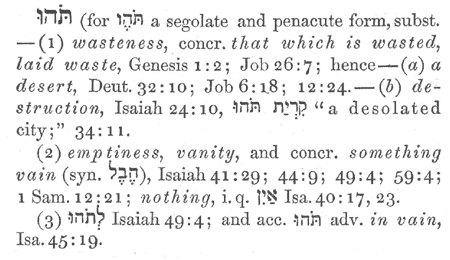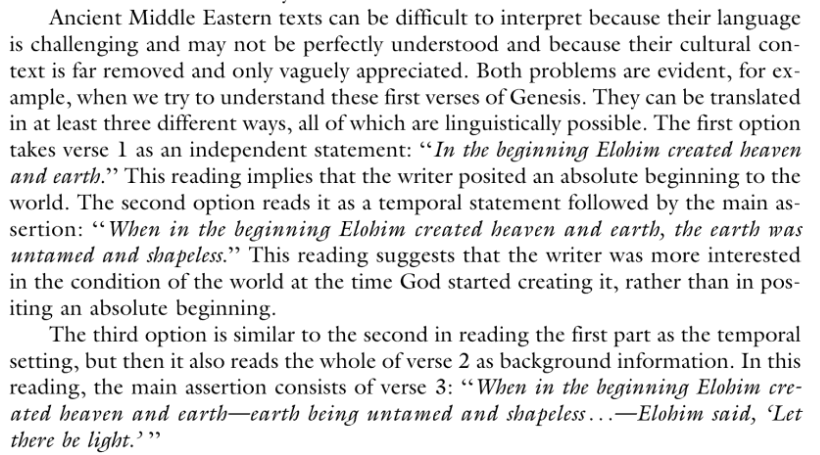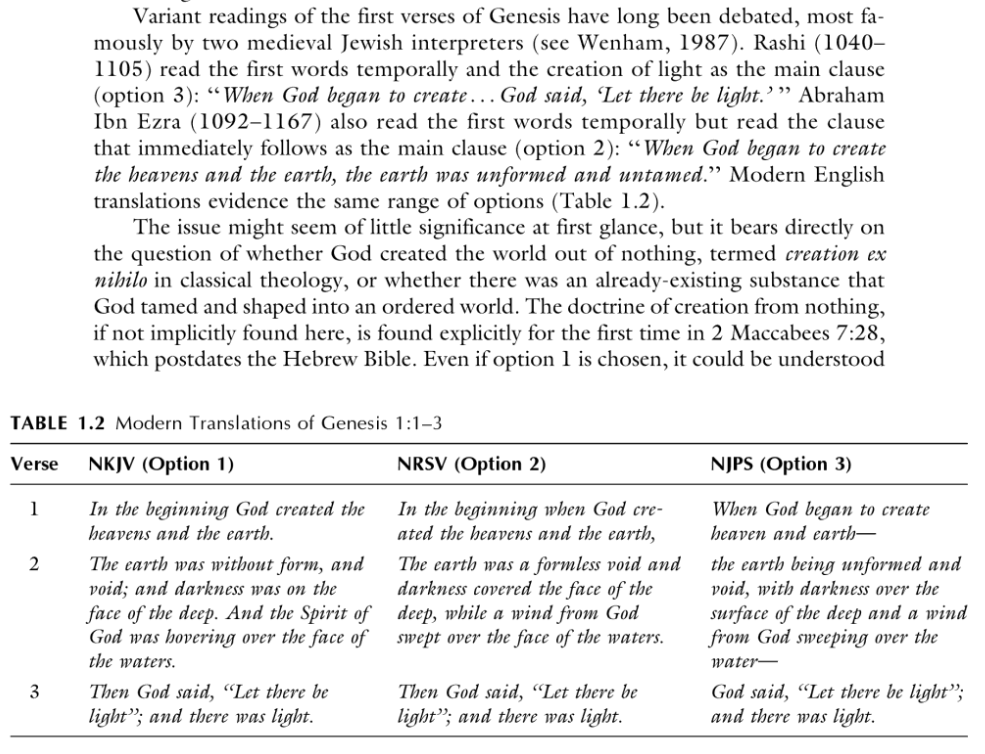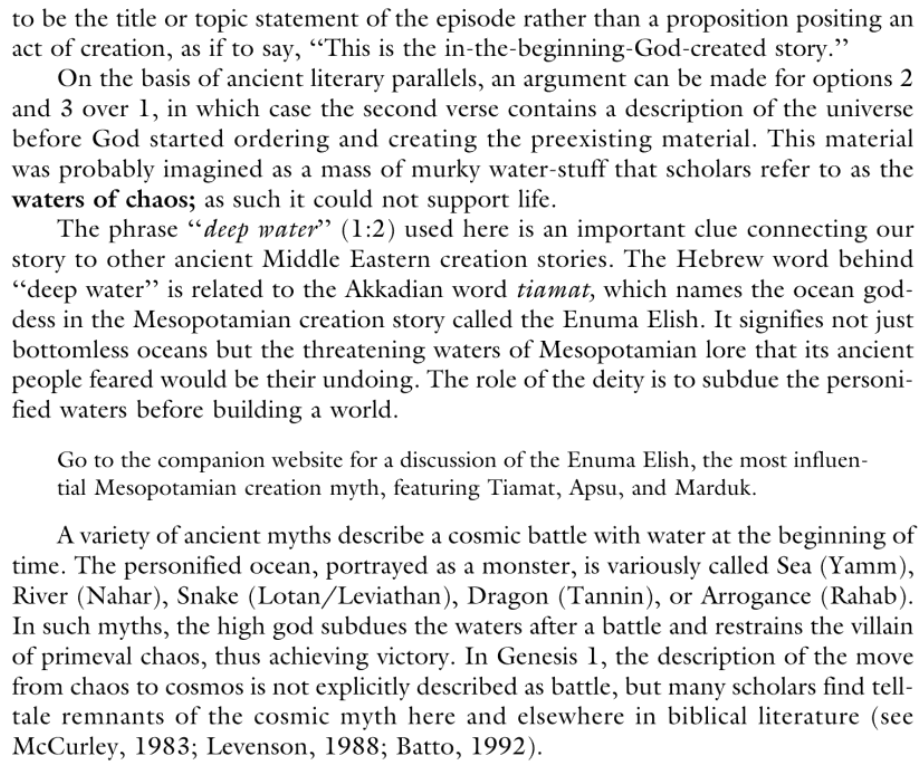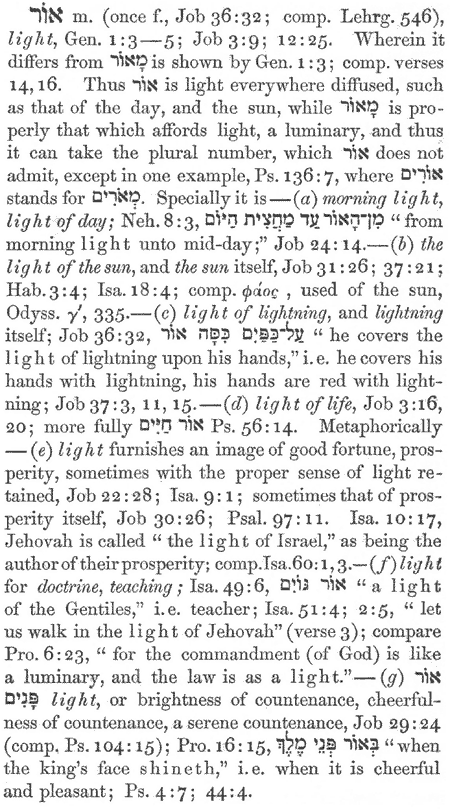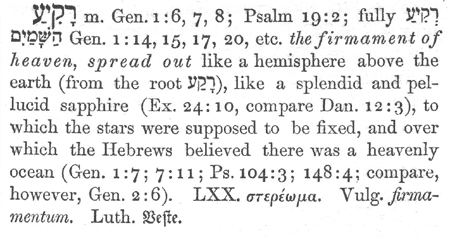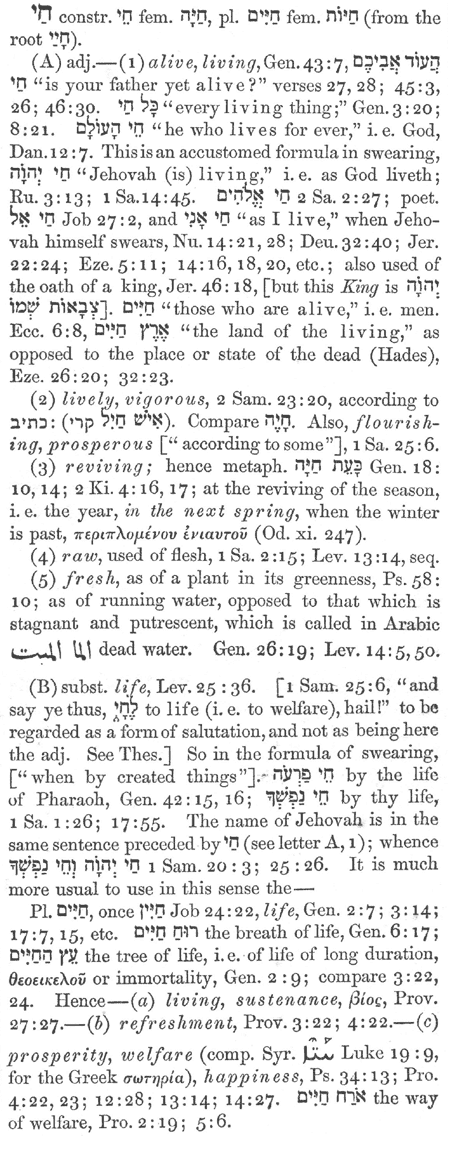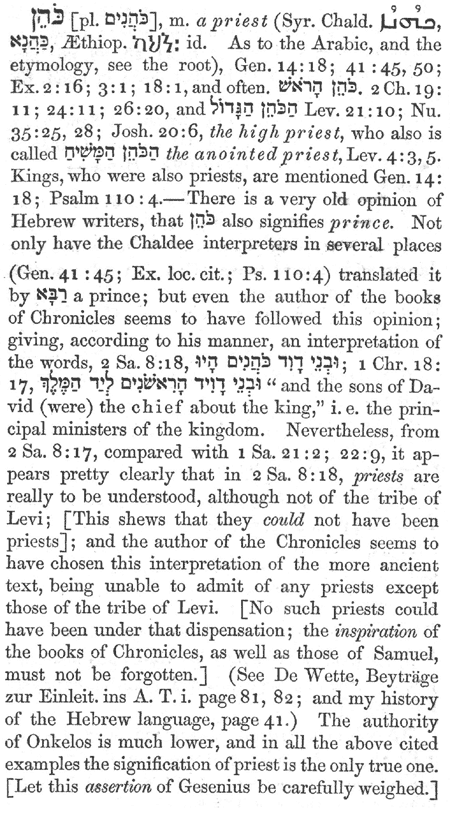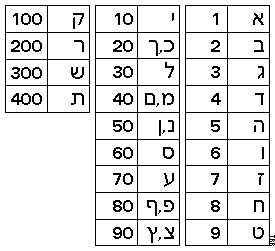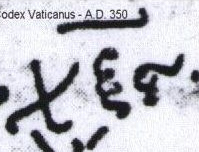Last updated: 2022-05-10
Here I’ve compiled a list of common misconceptions about the Torah. The number comes first with the misconception in quotes and my response follows below. These are ordered in a way so the later responses are based on the previous but other than that the order is arbitrary.
1. Misconception: “The Torah endorses slavery.”
Calling servants in the Torah “slaves” in the modern sense is an anachronism. Servants are free to run away. (Deuteronomy 23:15-16) This today would be called “a job” but with a long contract. The servant was free to break that contract but would face consequences from not being trusted to keep contracts with other people or employers. Indeed owners of actual slaves sometimes prevented slaves from reading parts of the Bible that were against what they were doing:
https://www.history.com/news/slave-bible-redacted-old-testament
2. Misconception: “You could force your daughter to marry someone.”
Although there are cases where women seem to be promised in a way that treats them like property, e.g. ‘Then Caleb said, “Whoever attacks Kiriath-sepher and takes it, I will give him my daughter Achsah as wife.”’ (Judges 1:12) this is not endorsed anywhere in the Torah. While women may have felt cultural pressure to comply with their father it follows from 1. that you couldn’t force someone to marry you or someone else because they could run away even if they were only a servant. How much more a daughter? In addition, you couldn’t capture someone in the first place and hence you couldn’t force anyone physically to do anything without a legal reason, see Exodus 21:16 and Deuteronomy 24:7. Later in Jewish law this principle still remains: there is no such thing as “jail” in Jewish law, only a temporary holding for judgment. This is incredibly libertarian for ancient law which was usually less individualist than today. I would argue that jail today is immoral according to the Torah, just give someone their punishment and let them go.
3. Misconception: “After a waiting period you could force a captive to marry you.”
The passage in question follows:
10 When you go out to war against your enemies, and the Lord your God hands them over to you and you take them captive, 11 suppose you see among the captives a beautiful woman whom you desire and want to marry, 12 and so you bring her home to your house: she shall shave her head, pare her nails, 13 discard her captive’s garb, and shall remain in your house a full month, mourning for her father and mother; after that you may go in to her and be her husband, and she shall be your wife. 14 But if you are not satisfied with her, you shall let her go free and not sell her for money. You must not treat her as a slave, since you have dishonored her. (Deu 21:10-14)
It follows from the previous that Deuteronomy 21:11 does not mean you can force someone to marry you. Marriage was arranged with the father of the woman and this law states that you are still allowed to marry someone that has no father. The phrase in Deuteronomy 21:13 “go in to her” does not describe sexual relations as you might think from reading other parts of the Bible because the Hebrew words there are literally “go in” and “husband” and are not elsewhere used to imply sex. Therefore there is not even a possible implication that you can have sex with her simply because the time is over. The word translated “dishonor” is used in Deuteronomy 22:24 for consensual sex so there is no implication of rape.
4. Misconception: “Rape wasn’t taken very seriously in the society of the Bible.”
This idea is often used in order to make excuses for interpretations of the Bible that are rape-friendly but nothing could be further from reality. There’s no case in that Bible where rape was taken lightly. The rape of the concubine in Judges was avenged by a national civil war. (Judges 19-21) The rape of Tamar by Amnon was avenged by Amnon’s death and possibly was the cause of another national civil war because David didn’t punish Amnon. (2 Samuel 13) What’s commonly called the rape of Dinah in Gen 34:2 was avenged by genocide. (Gen 34:25-31) According to this article, it may have even been consensual, but the crime was just taking advantage of an inexperienced young woman: https://www.myjewishlearning.com/article/dinah/ Do we even take rape that seriously today? I think not.
Women were protected from having their conjugal duty diminished “If he takes another wife to himself, he shall not diminish the food, clothing, or marital rights of the first wife.” (Ex 21:10) and Rachel and Leah were able to trade a night with Jacob for mandrakes Gen 30:14-18. Also note that it’s the less attractive Leah that tells Jacob: “‘You must come in to me; for I have hired you with my son’s mandrakes.’ So he lay with her that night.” God killed Onan for not having sex in a way that would cause pregnancy when he was supposed to perform the duty of the Levarite in Genesis 38:8-10. Rather than sex being an obligation of women, it seems that it was an obligation of men especially for the purpose of giving women children. This probably breaks a lot of the preconceptions most people have about the Biblical culture.
5. Misconception: “A virgin was supposed to marry her rapist.”
Given that Israelite culture tended to avenge rape with genocide and civil war, slipping this idea into the law would be difficult. The passage in question follows:
28 “If a man finds a young woman who is a virgin, who is not betrothed, and he seizes her and lies with her, and they are found out, 29 then the man who lay with her shall give to the young woman’s father fifty shekels of silver, and she shall be his wife because he has humbled her; he shall not be permitted to divorce her all his days. 30 “A man shall not take his father’s wife, nor uncover his father’s bed. (Deuteronomy 22:28-30)
The word in Deuteronomy 22:28 (“taphas” Qal Perfect form in Hebrew) is never used for rape elsewhere and is totally different and unrelated to the word used in Deuteronomy 22:25 for rape “chazaq” which is also in the causative form the “hiphil.” If they wanted to say this was rape they could have easily used the same word with the same form again to describe it in the previous case. In verse 28 it says “and they are found out” implying both are responsible and consenting in contrast to the rape in Deuteronomy 22:25-27 which refers to the man and the woman separately. The location (town or city) is not specified, unlike the situations before making this a seemingly different situation than the rape that is described before. “Taphas” is used in the same form in Gen 4:21 for playing the lyre and pipe . . . Here “taphas” is translated “seize” but is used in the context of persuasion:
Someone will even seize a relative,
a member of the clan, saying,
“You have a cloak;
you shall be our leader,
and this heap of ruins
shall be under your rule.” (Isaiah 3:6)
He is holding onto him in order to persuade him. Any forcible seizure would be short-lived given the power of kings in that day and age. In addition, Num 5:13 uses the niphal stem (Aspect: Perfect) as a reflexive to mean a woman who is “caught in the act” (NRSV) of adultery. In Deu 21:19 it is used in the Qal Perfect form to mean “take hold of him” to bring to the judges.
While “taphas” is used in contexts of war for the “capture” of people in battle or otherwise (hence probably why the NRSV above translates it as “seize”) it does not by itself imply force was used on those people (the threat of force is only implied by the situation). The question is: do we know how it is used in the context of a sexual encounter with a woman? No, it is only used in that context here in Deuteronomy 22:28. However, even if Taphas means “capture” or “non-consent” in this case there are other options besides interpreting it as rape which I will explain.
While Taphas is a different word than that used for rape immediately prior, it is also not used in Deuteronomy 22:22,23 to describe consensual sex. Instead of “hold” (taphas) H8610 and “lie with” (shachav) H7901 in Deuteronomy 22:28; the words used in verses 22 and 23 are “find” (matza) H4672 and “lie with” (shachav) H7901. So why the difference? If “taphas” implies a lack of consent or a “capture” then we may answer that both the father and the daughter had to consent to the marriage. The father’s authority can be established in many different places. The daughter’s authority to refuse can be established if you read the entirety of this blog post. If the father didn’t consent then that implies a “non-consent” or “capture” of the daughter which would fit with the word “taphas” being used to describe the non-consensual (but not necessarily violent) capture of people. In fact, the parallel of Deuteronomy 22:28 in Exodus 22:16 is in the context of damages to the household possessions via theft or negligence and Keil and Delitzsch say of Exodus 22:16:
The seduction of a girl, who belonged to her father as long as she was not betrothed (cf. Exodus 21:7), was also to be regarded as an attack upon the family possession. Whoever persuaded a girl to let him lie with her, was to obtain her for a wife by the payment of a dowry (מהר see Genesis 34:12); and if her father refused to give her to him, he was to weigh (pay) money equivalent to the dowry of maidens, i.e., to pay the father just as much for the disgrace brought upon him by the seduction of his daughter, as maidens would receive for a dowry upon their marriage. The seduction of a girl who was betrothed, was punished much more severely (see Deuteronomy 22:23-24).
https://biblehub.com/commentaries/kad/exodus/22.htm
This is backed up by the following verse Exodus 22:17 “But if her father refuses to give her to him, he shall pay an amount equal to the bride-price for virgins.” Therefore, if “taphas” H8610 in Deuteronomy 22:28 is used at all to describe a “capture” or “non-consent” then verses 29-30 give the context of what the “capture” or “non-consent” was from:
29 the man who lay with her shall give fifty shekels of silver to the young woman’s father, and she shall become his wife. Because he violated her he shall not be permitted to divorce her as long as he lives. 30 A man shall not marry his father’s wife, thereby violating his father’s rights. (Deuteronomy 28:29-30)
If it is a “capture” it is a “capture” from the father’s authority not from the woman’s own will since both the father and the woman must be willing to accept the man. The rights of the father are not randomly started in verse 30 but are a continuation of the right of the father to not have his daughter taken away (“captured”) without his consent and his right to the bride-price. In addition, this law is merged with the law about seduction in Exodus 22:16-17 in Philo, Josephus, and the Dead Sea Scrolls (11Q Temple Scroll) showing that they all interpreted it as being the same situation. This law is merely specifying the bride-price that was mentioned in Exodus and as a common-law addition, it is clarifying that you couldn’t use the loop-hole of divorce for the marriage commanded in Exodus.
All that being said there are plenty of examples where “taphas” is used to mean “wield” or “play” which seems like a much more likely association for a sexual encounter. I’m just giving an argument that even if you take it in the stronger ways it is used it doesn’t necessarily imply rape. This article has more details on the Hebrew in question: https://cbmw.org/2018/03/05/did-old-testament-law-force-a-woman-to-marry-her-rapist/
6. Misconception: “Masters could break up the marriages of slaves that they arranged to have married.”
The verses in question:
1 These are the ordinances that you shall set before them: When you buy a male Hebrew slave, he shall serve six years, but in the seventh he shall go out a free person, without debt. 3 If he comes in single, he shall go out single; if he comes in married, then his wife shall go out with him. 4 If his master gives him a wife and she bears him sons or daughters, the wife and her children shall be her master’s and he shall go out alone. 5 But if the slave declares, “I love my master, my wife, and my children; I will not go out a free person,” 6 then his master shall bring him before God. He shall be brought to the door or the doorpost; and his master shall pierce his ear with an awl; and he shall serve him for life. (Ex 21:1-6)
You couldn’t break up a marriage even if you were the employer of a servant. The servant that is said to go out in Ex 21:4 is clearly just becoming an independent (non-servant) if you read the context. This says nothing about the status of his marriage. However, he might want to stay employed with you so he could see his wife and kids consistently. Also according to Jesus:
3 He answered them, “What did Moses command you?” 4 They said, “Moses allowed a man to write a certificate of dismissal and to divorce her.” 5 But Jesus said to them, “Because of your hardness of heart he wrote this commandment for you. 6 But from the beginning of creation, ‘God made them male and female.’ 7 ‘For this reason a man shall leave his father and mother and be joined to his wife, 8 and the two shall become one flesh.’ So they are no longer two, but one flesh. 9 Therefore what God has joined together, let no one separate.” (Mark 10:7-9 emphasis mine)
7. Misconception: “You could trick someone into being your servant forever by giving him a wife.”
You couldn’t trick someone into serving you forever by setting them up with a wife they wanted to be around consistently, see Exodus 21:1-6 and Deuteronomy 15:16-17.
then his master shall bring him before God. He shall be brought to the door or the doorpost; and his master shall pierce his ear with an awl; and he shall serve him for life. (Ex 21:6)
Although it says “serve him for life” this doesn’t tell us exactly how their relationship changes. A son is also said to serve the father. Consider the following:
A. You are bringing him before God which suggests you are marking him for God’s service, not your own. Sometimes servants wore the mark of the God or employer they served, see Thayer’s: https://www.blueletterbible.org/lang/Lexicon/Lexicon.cfm?strongs=G4742&t=KJV
B. You are taking him to the doorpost where the law of God was posted.
C. God gave the Israelites the right to stay on the land and own the houses and land they had. (Leviticus 25:22-34)
D. Sons are said to serve the father. The same word for servant is used in Malachi 3:17 and a son is not different than a servant until inheritance comes into play Galatians 4:1-3
E. Sons had to follow all the commands of the father and did not have their own source of income as implied by Luke 15:11-32.
F. A servant is said to become an heir if he is pampered in many translations of Proverbs 29:21, see ESV and YLT for examples. However, the Hebrew is uncertain and different translations render it differently.
G. The only other examples of blood being put on the earlobes in a ceremony is of a transfer from a lower status to a higher one: the cleansing of the leper and the consecration of the priests: Lev 14:1-4, Leviticus 8:1~
H. Karel van der Toorn is a secular theologian who has studied the Biblical ceremony of piercing the ear with an awl and has concluded that it is was an adoption ceremony. (see the book “God in Context”)
8. Misconception: “You could beat your servants for no reason and you weren’t punished unless they died within a day.”
The relevant verses follow:
20 When a slaveowner strikes a male or female slave with a rod and the slave dies immediately, the owner shall be punished. 21 But if the slave survives a day or two, there is no punishment; for the slave is the owner’s property. (Ex 21:20-21 NRSV)
Now it’s obvious you couldn’t beat someone to death as it says here where the same word is used for “strikes:” “Whoever strikes a person mortally shall be put to death.” (Exodus 21:12) Actually, if you did any significant (or maybe permanent) damage to your servant they would become an independent: Exodus 21:26-27 The reason you could punish servants (assuming you were the head of a household) is that you were part of the legal system. Just as today we might post the law of the land on the courthouse so in that time the laws of God were posted on the gates (where the elders sat) and on the doorposts of houses: Deuteronomy 6:9 and Deuteronomy 11:20. Regardless of whether you agree with the implications of where the law was posted, it is a fact that the legal system was much more distributed in the Torah than in most modern societies. Take for example the avenger of blood in Deuteronomy 19:11-12 which was just a person in the victim’s family.
The mention of the servant as “property” is literally “money” and there is a curious similarity to the previous verses which talk about compensating individuals for loss of work and cost of recovery in a fight:
18 When individuals quarrel and one strikes the other with a stone or fist so that the injured party, though not dead, is confined to bed, 19 but recovers and walks around outside with the help of a staff, then the assailant shall be free of liability, except to pay for the loss of time, and to arrange for full recovery. (Exodus 21:18-19)
The case in verse 21 for the servant living one or two days is not for when it looked like they had died of their injuries because beating someone near death would do significant and probably permanent damage and hence make the servant an independent causing the death of the servant to be avenged as an independent person. (this is just for those who think Ex 21:12 didn’t apply with servants for some reason) Rather verse 21 is for a case where it is unknown what killed the servant.
However, is there a connection to the two independent men fighting and compensation? I think verse 21 simply specifies that since the servant was a source of income and value to the employer that any uncertainty in what caused the death should be decided in the employer’s favor since he is presumed to have suffered a loss from this. This seems to not be the case with independent men since nothing is said about whether the victim dies a day or two later.
Another view (that I’m not in favor of) is that the employer would not be liable for the loss of time of the servant unlike the two men fighting since the employer suffers a loss from having to support the servant while recovering. If this were the case it would suggest that the punishment for a servant could be rather harsh. I don’t agree with this for several reasons: 1. The passage does not specify what to do when the servant is confined to bed but recovers. It only specifies what to do if the servant is confined to bed and then dies. It would be nonsensical to assume anything about compensating the servant in a case where he dies. 2. The Bible also prevents harsh beatings even if they would only be “degrading:” “Forty lashes may be given but not more; if more lashes than these are given, your neighbor will be degraded in your sight.” (Deuteronomy 25:3 NRSV) Life-threatening beatings would seem to be excluded by preventing “degrading” beatings.
9. Misconception: “The Torah Condones Burning People Alive”
The relevant verses follow:
When the daughter of a priest profanes herself through prostitution, she profanes her father; she shall be burned to death. (Leviticus 21:9 NRSV)
This wasn’t actually “burned to death” but “burned after death.” Compare this more literal translation with the story of Achan in Joshua 7 where he is condemned to be burned with fire but is stoned then burned with fire:
`And a daughter of any priest when she polluteth herself by going a-whoring — her father she is polluting; with fire she is burnt. (Leviticus 21:9 YLT)
See the excerpt on Achan below:
15 And the one who is taken as having the devoted things shall be burned with fire, together with all that he has, for having transgressed the covenant of the Lord, and for having done an outrageous thing in Israel.’”
. . .
25 Joshua said, “Why did you bring trouble on us? The Lord is bringing trouble on you today.” And all Israel stoned him to death; they burned them with fire, cast stones on them, 26 and raised over him a great heap of stones that remains to this day. Then the Lord turned from his burning anger. Therefore that place to this day is called the Valley of Achor. (Leviticus 7:15-26 NRSV)
10. Misconception: “The punishments in the Torah are exact.”
The punishments in the Torah are actually maximum punishments. For instance, the punishment for adultery is said to be death (Leviticus 20:10) but Hosea was able to not punish his wife for adultery and it also speaks of accepting compensation for adultery in Proverbs:
32 But he who commits adultery has no sense;
he who does it destroys himself.
33 Blows and disgrace are his lot,
and his shame will never be wiped away.
34 For jealousy arouses a husband’s fury,
and he will show no mercy when he takes revenge.
35 He will not accept any compensation;
he will refuse a bribe, however great it is. (Proverbs 6:32-35)
In addition, the punishment listed for adultery in Numbers 5 does not include death:
18 The priest shall set the woman before the Lord, dishevel the woman’s hair, and place in her hands the grain offering of remembrance, which is the grain offering of jealousy. In his own hand the priest shall have the water of bitterness that brings the curse. 19 Then the priest shall make her take an oath, saying, “If no man has lain with you, if you have not turned aside to uncleanness while under your husband’s authority, be immune to this water of bitterness that brings the curse. 20 But if you have gone astray while under your husband’s authority, if you have defiled yourself and some man other than your husband has had intercourse with you,” 21 —let the priest make the woman take the oath of the curse and say to the woman—“the Lord make you an execration and an oath among your people, when the Lord makes your uterus drop, your womb discharge; 22 now may this water that brings the curse enter your bowels and make your womb discharge, your uterus drop!” And the woman shall say, “Amen. Amen.”23 Then the priest shall put these curses in writing, and wash them off into the water of bitterness. 24 He shall make the woman drink the water of bitterness that brings the curse, and the water that brings the curse shall enter her and cause bitter pain. 25 The priest shall take the grain offering of jealousy out of the woman’s hand, and shall elevate the grain offering before the Lord and bring it to the altar; 26 and the priest shall take a handful of the grain offering, as its memorial portion, and turn it into smoke on the altar, and afterward shall make the woman drink the water. 27 When he has made her drink the water, then, if she has defiled herself and has been unfaithful to her husband, the water that brings the curse shall enter into her and cause bitter pain, and her womb shall discharge, her uterus drop, and the woman shall become an execration among her people. 28 But if the woman has not defiled herself and is clean, then she shall be immune and be able to conceive children.
(Numbers 5:18-28)
It also states that the owner of an ox that is accustomed to gore shall be put to death–but then states right after that payment can also be required of the owner instead:
28 When an ox gores a man or a woman to death, the ox shall be stoned, and its flesh shall not be eaten; but the owner of the ox shall not be liable. 29 If the ox has been accustomed to gore in the past, and its owner has been warned but has not restrained it, and it kills a man or a woman, the ox shall be stoned, and its owner also shall be put to death. 30 If a ransom is imposed on the owner, then the owner shall pay whatever is imposed for the redemption of the victim’s life. 31 If it gores a boy or a girl, the owner shall be dealt with according to this same rule. 32 If the ox gores a male or female slave, the owner shall pay to the slaveowner thirty shekels of silver, and the ox shall be stoned. (Exodus 21:28-32)
David also gives a deviant judgement from the letter of the law based on circumstances:
4 When the woman of Tekoa came to the king, she fell on her face to the ground and did obeisance, and said, “Help, O king!” 5 The king asked her, “What is your trouble?” She answered, “Alas, I am a widow; my husband is dead. 6 Your servant had two sons, and they fought with one another in the field; there was no one to part them, and one struck the other and killed him. 7 Now the whole family has risen against your servant. They say, ‘Give up the man who struck his brother, so that we may kill him for the life of his brother whom he murdered, even if we destroy the heir as well.’ Thus they would quench my one remaining ember, and leave to my husband neither name nor remnant on the face of the earth.”
8 Then the king said to the woman, “Go to your house, and I will give orders concerning you.” 9 The woman of Tekoa said to the king, “On me be the guilt, my lord the king, and on my father’s house; let the king and his throne be guiltless.” 10 The king said, “If anyone says anything to you, bring him to me, and he shall never touch you again.” 11 Then she said, “Please, may the king keep the Lord your God in mind, so that the avenger of blood may kill no more, and my son not be destroyed.” He said, “As the Lord lives, not one hair of your son shall fall to the ground.” (2 Samuel 14:1-33)
Also, the phrase “an eye for an eye” in the lex talionis passages could be literally translated as “an eye under an eye” and there is a different phrase used in Deuteronomy (where a false witness attempts to incriminate someone) to say that the same punishment should be implemented on that witness.
. . . שֶׁבֶר, תַּחַת שֶׁבֶר, עַיִן תַּחַת עַיִן . . . (Leviticus 24:20)
. . . עַיִן תַּחַת עַיִן, שֵׁן תַּחַת שֵׁן . . . (Exodus 21:24)
. . . עַיִן בְּעַיִן שֵׁן בְּשֵׁן, יָד בְּיָד, רֶגֶל בְּרָגֶל . . . (Deuteronomy 19:21)
Finally it is well understood that the lex talionis is not literal, see:
An Eye for an Eye: Proportionality as a Moral Principle of Punishment
Morris J. FishOxford Journal of Legal Studies Vol. 28, No. 1 (Spring, 2008), pp. 57-71 (15 pages)Published By: Oxford University Press

https://www.jstor.org/stable/20185360
11. Misconception: “The Torah was a rule-book that had to followed exactly like today’s modern law”
Rather I think the Torah was very situational. This idea follows partially from 10. I think this and number 10 might be on of the main misconceptions that prevent Christians from thinking the Torah is relevant today–otherwise it is too harsh and can’t be molded to our present situation. To give an example by what I mean by this, even though I have been talking about the household in the Torah as being run by one man (the pater-familias or the father–which one I am uncertain) I don’t necessarily think that it needs to be run by men or that there needs to be a single head of the household. I think the rules in the Torah were more general guidelines that could be changed based on the situation. For instance, Deborah was a leader of the whole of Israel and she was married. It wouldn’t make sense if her husband was the authority over her given that situation and her leadership skills and given that she needed to be free from her husband’s rules at every moment since there would have been emergencies where she needed to accomplish her leadership tasks. Instead, I think the rules that assume males are in charge in the Torah are more of a general situation. You might be able to get from this that men in general are better leaders, or that it is better generally to have them in charge because otherwise they will be upset and cause problems, but it doesn’t mean that this is a hard and fast rule. I speak more about Deborah and the misconception of necessary male authority in the church here:
Here is a good summary of this idea:
The idea that divine law can be as malleable as human law no doubt sounds counterintuitive. Humans are fallible and limited in their perspective; God’s wisdom is infinite, and surely His laws cannot be altered. This intuition, however, rests on a misunderstanding. The fluid nature of common law stems only partially from the limitations of the human jurist. It also stems from the fluidity of society itself, a quality of human life to which even divine law must adapt.
This position was forcefully advocated by one of the most creative rabbinic minds of the 19th century: Tzadok ha-Cohen Rabinowitz of Lublin (1823-1900), a great hasidic master. As against the many voices in the rabbinic tradition who have seen halakhah as a relatively static inheritance passed down through an unbroken chain of transmission, Rabinowitz adheres to an alternative view that emphasizes its changing and dynamic nature. This alternative view is substantiated by the way Scripture itself approaches the law. There, laws do not assume a single, immutable form. Rather, the basic institution undergoes restatement and receives new expression through the generations.
To Rabinowitz, the Ten Commandments themselves were subject to adaptation. The Decalogue, after all, appears in two versions in the Torah. The first is at Sinai, in Exodus 20. The second is in Deuteronomy 5, where Moses “recounts” what God said at Sinai. Remarkably, there are discrepancies—some only of style, but others of substance.
The rabbis of the Talmud resolve these discrepancies by attributing them to the unique nature of divine speech. When God spoke at Sinai, they explain (Sh’vuot 20b), the complexity of His word could be conveyed only by preserving two separate records of that communication. But Rabinowitz rejects this explanation. For him, God spoke the version recorded in Exodus, while Moses’ retelling of the Decalogue in Deuteronomy is a reapplication of God’s word in accordance with the needs of the new generation about to enter the land.6
The same patterns of reinterpretation and reapplication of a biblical command can be seen with regard to the laws of the Sabbath, Passover, levirate marriage, and many other commandments throughout the Bible. Who controlled these processes of scriptural interpretation and reapplication? Were all laws open to endless revision? Were there foundational principles that guided the process? The Bible is remarkably silent on these issues, registering no anxiety about what for observant Jews today are matters of burning import.
But if the limits and controls of the legal process in biblical times are shrouded in mystery, we do know this: when Israel flagrantly ignored a particular instruction, the prophets would register divine disapproval. Thus, for example, Israel is criticized for completely ignoring the injunction against working the land during the sabbatical year.7 Yet, despite censuring Israel for these and many more grievous failings—theft, murder, idolatry—nowhere do the prophets throw the book at the people for performing a law in a fashion that happens to differ from the Torah’s specific prescription. “So it shall be written; so it shall be done!”—the essence of codified law—was fine for Cecil B. DeMille’s 1956 film The Ten Commandments. But the actual Ten Commandments and many other commandments were interpreted and applied by judges and leaders through the processes of common law.
https://mosaicmagazine.com/essay/uncategorized/2013/12/what-is-this-thing-called-law/

